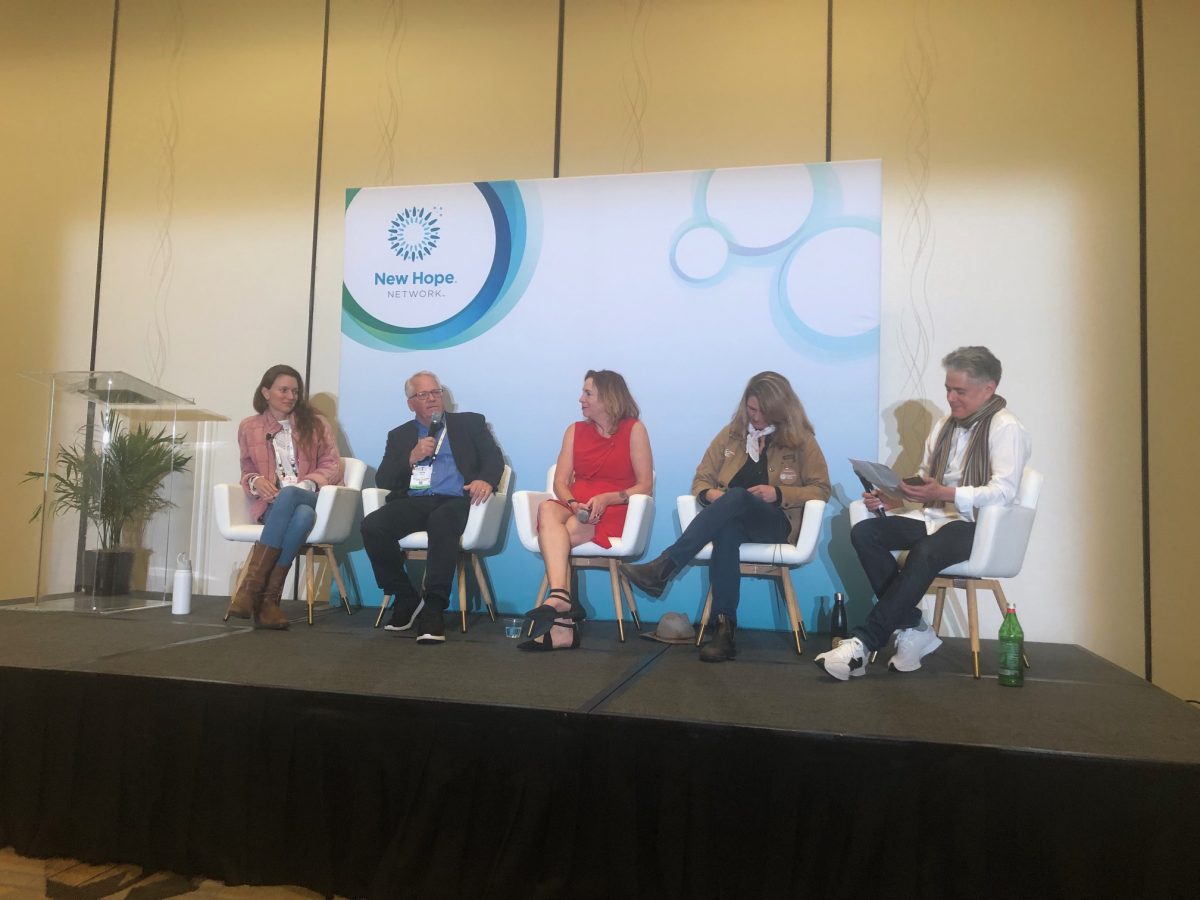Testy exchange marks precision fermentation session at Expo West

In response to a complaint that the session was one-sided opposing the GMO technology, panelists said synthetic biology conferences are one-sided in favor of the technology, and that precision fermentation companies have no business exhibiting at a natural products trade show.
An educational session at Natural Products Expo West on so-called “precision fermentation”—a new GMO/synthetic biology technology—saw a testy exchange between a supporter of the technology and panelists who oppose it.
The session, “Is precision fermentation regenerative?” was sponsored by the Non-GMO Project and featured a panel of Megan Westgate, executive director of the Non-GMO Project; Alan Lewis, vice president of government affairs at Natural Grocers; Karen Howard, executive director of Organic and Natural Health Association; Elizabeth Whitlow, executive director of Regenerative Organic Alliance; and panel moderator Max Goldberg, founder of Organic Insider.
Precision fermentation is a GMO technology
The session began with Westgate describing the precision fermentation technology and emphasizing that it is a GMO technology. Synthetic biology companies use GMO microorganisms and multiply them to produce foods, ingredients, and other products.
“At the end of the day we are talking about products produced in vats using GMO microbes,” Westgate said.
Synbio companies even make non-GMO claims, she said.
Lewis said there are no safety studies or regulations on the GMO-derived products, which are entering the food supply. Some examples include Impossible Foods’ Impossible Burger, Perfect Day’s dairy proteins, and Remilk dairy alternatives.
He said products of precision fermentation/synbio technology are “threatening whole generations.”
“This technology represents a widespread threat to every ecosystem on the planet,” he said. “Our microbiome has never experienced these organisms, and we don’t know how they will react to them.”
Howard said the synbio companies are co-opting a positive message of being a sustainable, climate-friendly alternative to industrial agriculture with its use of environmentally damaging factory farms, pesticides, and GMOs.
“They stole the messaging and are using it but we can absolutely do this with regenerative agriculture,” she said.
ESG standards will expose precision fermentation’s harmful practices
Lewis eviscerated the claims of precision fermentation, saying the companies use natural gas from fracking and products such as GMO corn, which is produced using nitrogen fertilizer that pollutes water sources and toxic pesticides.
Lewis said the precision fermentation companies will have to disclose the damaging sources of their technology with requirements of Environmental, Social, and Business Governance (ESG) standards that are coming to the forefront.
“ESG is the answer,” Howard said. “There is opportunity for all the brands that are doing it right to shine. We are hoping that it will draw a line, and at least people will know.”
“With ESG disclosures, it (precision fermentation industry) will be shut down,” Whitlow said.
Westgate said precision fermentation companies are making the same claims of “feeding the world” that biotech companies made about crops made using “older” GMO technology.
“They aren’t calling their products GMO but they are saying the world needs these products,” she said.
“They have created a false front that their technology is good,” Howard said.
The Non-GMO Project has three full-time researchers tracking more than 500 companies using precision fermentation.
“The proliferation of new GMO ingredients is like nothing we’ve seen. It’s incredibly hard to keep track of,” Westgate said. “People need to understand that synbio is GMO.”
The earlier GMOs had to be approved by a weak regulatory process, but now there are no regulations on the new GMOs, Westgate said. “I am intrigued by how ESG can impact this,” she said.
Several panelists objected to the fact that synbio/precision fermentation companies such as Impossible Foods were exhibiting at Expo West. Many natural and organic food supporters have criticized Expo West organizer New Hope Network for allowing the GMO companies to exhibit at the show.
“There is no place for these products at this show,” Whitlow said.
Lewis said: “It is “pure human hubris” of the GMO companies to think they can “fix nature.”
“Nature always wins,” he said. “Even the companies know their technology is dangerous.”
Lewis referred to the SEC filing of major synbio player and owner of Motif FoodWorks, Ginkgo Bioworks, which says that the release of the GMOs the company develops “could impact the environment or community generally or the health and safety of our employees, our customers’ employees, and the consumers of our customers’ products.”
Westgate said precision fermentation technology derives from a “fragmented mindset.” “It’s a mindset that says we are separate from nature but we are part of nature.”
Testy exchange over focus of session
During the question-and-answer session, a member of the audience complained that the panel was one-sided in its opposition to precision fermentation.
“This was an opportunity to have a healthy dialogue with scientific evidence. It’s a shame we didn’t have the discussion about the problems with meat and milk,” he said.
He also claimed that there is not enough land for regenerative agriculture to meet the world’s food needs, and said the safety concerns with precision fermentation “are manageable.”
In response, John Fagan, chief scientific officer at Health Research Institute, said precision fermentation technologies are “as bad or worse than animal agriculture” and “misguided.”
“If you aren’t connected with nature, decisions are made that don’t support where we want to go,” he said. “I’m a molecular biologist and know what’s behind the technology.”
Lewis responded by saying that synthetic biology industry events he’s attended are one-sided in favor of the technology.
“There are no discussions about risk and ecology,” he said. “There is a fervent belief that there is nothing wrong (with the technology), and there is a lack of a debate within the synbio industry.”
Westgate said she would be happy to participate in a debate about the precision fermentation if New Hope would hold one. As it is, she said her group had to pay to hold the session.
She also said she appreciated the man’s perspective though she strongly disagreed with him.
Organic & Non-GMO Insights April 2023




